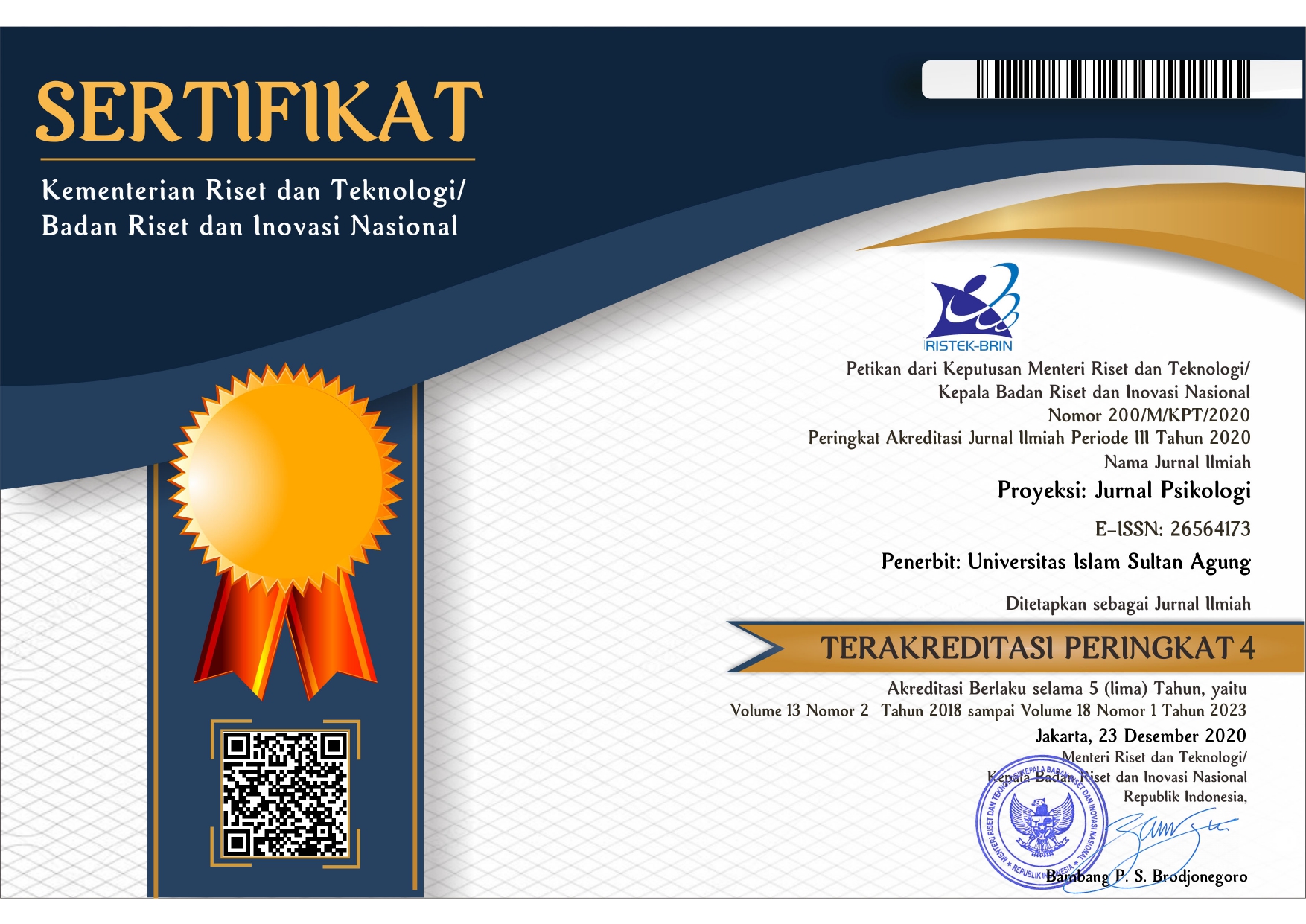PENINGKATAN SOFT SKILL MELALUI KEGIATAN MERDEKA BELAJAR KAMPUS MERDEKA (MBKM)
Abstract
Penelitian ini bertujuan untuk mengetahui dampak program MBKM pada mahasiswa Program Studi Psikologi UNISSULA, yaitu dalam peningkatan soft skills berupa kemampuan komunikasi, adapatabilitas karir, kepemimpinan, inovasi dan kolaborasi. Tujuan lainnya adalah untuk mengetahui perbedaan kemampuan soft skills antara mahasiswa yang mengikuti program MBKM dengan yang tidak. Subyek penelitian ini 64 mahasiswa peserta MBKM dan 65 mahasiswa yang tidak mengikuti program MBKM. Instrumen yang digunakan dalam penelitian ini ada adalah Communicative Competence Scale atau CCS yang disusun oleh Weimann (1979), Empowering Leadership Questionarie atau ELO (Arnold, dkk, 2000), skala Adapatabilitas Karir dari Savickas (1998), Inovation Work Behavior Scale (IWB) dari Jansens (2000) dan Assessment of Interprofessional Team Collaboration Scale (AITCS) yang disusun Orchad at al (2012). Hasil analisis varian untuk menguji perbedaan antar soft skills tidak ditemukan berbedaan baik pada mahasiswa peserta MBKM maupun Non MBKM. Selanjutnya, meskipun sekilas ada terlihat bahwa rerata soft skills mahasiswa program MBKM lebih tinggi dibanding soft skills mahasiswa Non MBKM, perhitungan Uji t menunjukkan bahwa perbedaan hanya terjadi pada kompetensi Kepemimpinan dengan nilai t sebebar 2.06 (p< 0.05). Meskipun demikian, secara keseluruhan soft skills (gabugan skor komunikasi, adapatabilitas karir, kepemimpinan, komunikasi dan inovasi) mahasiswa MBKM dan non MBKM berbeda siginifikan dengan t sebesar 1.770 (p=0.0354), artinya rerata soft skills mahasiswa MBKM lebih tinggi daripada soft skills mahasiswa non MBKM. Penelitian ini menyimpulkan bahwa mahasiswa yang mengikuti program MBKM mempunyai rerata soft skills yang sedikit lebih tinggi dibanding mahasiswa Non MBKM. Perbedaan secara siginifikan terjadi pada kompetensi kepemimpinan.
Keywords
Full Text:
PDFReferences
Annet, Nancy. 1997. Collaborative Learning: Definitions, Benefits, Applications, and Dangers in the Writing Center. http://writing2.richmond.edu/training/fall97/nanne/index.html (Akses tanggal 17/12/2001.
Arnold, Josh., Arad, Sharon., Rhoades, Jonanthan and Drasgow, Fretz. 2000. The empowering leadership questionnaire: the construction and validation of a new scale for measuring leader behaviors. Journal of Organizational Behavior · May 2000.DOI: 10.1002/(SICI)1099-1379(200005)21:33.0.CO;2-#
Arta, Berti. 2018. Multiple Studies: The Influence of Collaborative Learning Approach on Indonesian Secondary High School Students’ English-Speaking Skill. English Language Teaching Educational Journal, 1(3), 149-160.
Baskaran, Shruthi dan Mehta, K. 2016. What is innovation anyway? Youth perspectives
from resourceconstrained environments. Technovation.
http://dx.doi.org/10.1016/j.technovation.2016.01.005i
Bucata, George & Rizescu, Alexandru Marius.2017. The Role Of Communication In
Enhancing Work Effectiveness Of An Organization. Land Forces Academy Review Vol. XXII, No 1(85), 2017
Dahiya, Rinki dan Raghuvanshi, Juhi. 2021. Validation of innovative work behaviour scale: Indian apparel manufacturing sector. Asia Pacific Management Review. https://doi.org/10.1016/j.apmrv.2021.06.002
Dikti (2020). Buku Panduan Merdeka Belajar – Kampus Merdeka. Jakarta: Direktorat Pendidikan Tinggi Kemendikbud Ristek Dikti
England, Trevor K., Nagel, Gregory dan Salter, Sean P. 2019. Using collaborative learning to develop students’ Soft skills. Journal of Education for Business, https://doi.org/10.1080/08832323.2019.1599797
Hamtiaux, Armanda., Houssemand, Claude., Vrignaud, Pierre. 2013. Individual and career adaptability: Comparing models and measures. Journal of Vocational Behavior, 83, 130-141
Jenssen, One. 2001. Job demands, perceptions of eVort–reward fairness and innovative work behavior. Journal of Occupational and Organizational Psychology.73, 287302.
Klingborg, Donald., Sonya, Morge dan Hammond, Varea. 2006. What Is Leadership? Journal of Veterinary Medical Education 33(2). DOI: 0.3138/jvme.33.2.280
Laal, Marjan dan Laal, Moszghan. 2012. Collaborative learning: what is it? Procedia - Social and Behavioral Sciences 31 (2012) 491 – 495.
Lai, Emily, R. 2011. Collaboration: A Literature Review. Research Report. http://www.pearsonassessments.com/research.
Martin, S., Kapungu, C., Goelz, M. & Fritz, K. (2019). Investigating Soft skills Program Features with a Gender Lens: A global review of education and workforce interventions for youth. Washington, DC: International Center for Research on Women
Napitupulu, Elvis dan Minarni, Ani. 2019. Learning Approach and Soft-skills Contribution toward Mathematical Higher Order Thinking Skill of Junior High School Students. American Journal of Educational Research, vol. 7, no. 12 (2019): 925-929. doi: 10.12691/education-7-12-5.
National Educational Association.20017. Preparing 21st Century Students for a Global Society An Educator’s Guide to the “Four Csâ€. NEA : http://www.p21.org/documents/Critical%20Skills%20
Orchad, Carole., King, Gillian., Khalili, Hosein., Bezzina, Marrybeth. 2012. Assessment of Interprofessional Team Collaboration Scale (AITCS): Development and Testing of the Instrument. JOURNAL OF CONTINUING EDUCATION IN THE HEALTH PROFESSIONS, 32(1):58–67. Published online in Wiley Online Library (wileyonlinelibrary.com). DOI: 10.1002/chp.21123
OECD.2018. The future of education and skills Education 2030. Paris Cedex 16-France: OECD publications.
Partnership21(P21). What We Know About CRITICAL THINKING Part of the 4Cs Research Serie. Partnership for 21st Century Skills. Washington: Partnership for 21st Century Learning. www.p21.org
Phoebe, Ezeanyanike A. 2013. Assessing Benefits of Collaborative Learning Environment for Quality Higher Education in Nigeria. Journal of Educational and Social Research. Vol. 3 No. 6 September
Rao, SRINIVAS. 2019. Collaborative Learning in English Language Learning Environment. Research Journal of English Language and Literature (RJELAL) A Peer Reviewed (Refereed) International Journal. Vol.7.Issue 1. 2019 (Jan-Mar).
Ramadanty, Sari dan Martinus, Handy. 2016. Organizational Communication: Communication And Motivation In The Workplace. HUMANIORA Vol. 7 No.1 January 2016: 77-86.
Razali, Nadiyah., Noor, Moh Adly., Ahmad, Moh Hafiez dan Shabodin, Faaziah. 2017. Enhanced student Soft skills through integrated online project based collaborative learning. International Journal of Advanced and Applied Sciences, 4(3), Pages: 59-67
Savickas L Mark., Erik J. Porfeli, 2012. Career Adapt-Abilities Scale-USA Form: Psychometric properties and relation to vocational identity. Journal of Vocational Behavior 80 (2012) 748-753
Savickas, L. Mark. 1997. Career Adaptability: An Integrative Construct for Life-Span, L i feSpace Theory. The Career Developmentquarterly/ March 1997/ Vol. 45
Slavin, Robert. 1980. Cooperative Learning. Review of Educational Research Summer, 1980, Vol. 50, No. 2, Pp. 315-342. DOI: 10.3102/00346543050002315 World Economic Forum. 2019. Centre for the New Economy and Society White Paper Strategies for the New Economy Skills as the Currency of the Labour Market. WEF: CH-1223 Cologny/Geneva Switzerland
Weimann, John. 1977. Explication and Test of a Model of Communicative Competence. Vol. 3 No. 3 Spring 1977
Zehr, Mary Ann.1998. New Office Economy Putting GreaterDemands on Schools, Researcher Says. https://www.edweek.org/teaching-learning/new-officehttps://www.edweek.org/teaching-learning/new-office-economy-putting-greaterdemands-on-schools-researcher-says/1998/02economy-putting-greaterdemands-on-schools-researcher-says/1998/02 .Education Week. Februari 1998.
DOI: http://dx.doi.org/10.30659/jp.17.1.112-126
Refbacks
- There are currently no refbacks.

Proyeksi by https://jurnal.unissula.ac.id/index.php/proyeksi/ is licensed under a Creative Commons Attribution-ShareAlike 4.0 International License.


